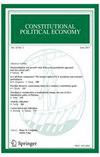Endogenous preferences: a challenge to constitutional political economy’s normative foundation?
IF 0.7
Q2 LAW
引用次数: 0
Abstract
Abstract This paper starts with the observation from behavioral economics that preferences are endogenous, i.e., they are unstable, context-dependent, and open to processes of adaptation. It then asks whether welfare analysis and normative economics are still possible in a world populated by people with endogenous preferences. In particular, it looks at recent proposals by Viktor Vanberg and Carl Christian von Weizsäcker. In highlighting an institutional perspective, both can be seen as proponents of modern ordoliberalism and both claim that their approaches can deal with the issue of endogenous preferences in a more coherent way than approaches that remain within the mind frame of traditional welfare economics. The paper argues that in mainly highlighting the importance of information provision for individual autonomy, Vanberg’s approach of constitutional political economy (CPE) underestimates the complexity of preference endogeneity. While von Weizsäcker’s approach is a refinement of the CPE framework, the paper argues that it focuses too much on external structural conditions (viz., competition among interpersonal influences) and neglects a discussion of the necessary internal agentic capabilities for individual autonomy. The paper argues that a more intricate discussion of decision autonomy leads to a twin concern for outcome and process freedom in normative economics. Outcome freedom allows individuals to satisfy their evolving preferences and process freedom enables them to critically reflect upon their preferences and surroundings.

内生偏好:对宪政政治经济学规范基础的挑战?
摘要:本文首先从行为经济学的观点出发,认为偏好是内生的,即不稳定的、依赖于环境的、对适应过程开放的。然后,它提出,在一个由具有内生偏好的人组成的世界里,福利分析和规范经济学是否仍然是可能的。它特别关注了维克多·范伯格(Viktor Vanberg)和卡尔·克里斯蒂安·冯(Carl Christian von) Weizsäcker最近的提议。在强调制度视角方面,两者都可以被视为现代自由主义的支持者,并且都声称他们的方法可以以比传统福利经济学思维框架内的方法更连贯的方式处理内生偏好问题。本文认为,范伯格的宪政政治经济学(CPE)方法主要强调信息提供对个体自治的重要性,低估了偏好内生性的复杂性。虽然von Weizsäcker的方法是对CPE框架的改进,但该论文认为,它过于关注外部结构条件(即人际影响之间的竞争),而忽略了对个人自治所需的内部代理能力的讨论。本文认为,对决策自主性的更复杂的讨论导致了规范经济学对结果和过程自由的双重关注。结果自由允许个人满足他们不断变化的偏好,过程自由使他们能够批判性地反思他们的偏好和环境。
本文章由计算机程序翻译,如有差异,请以英文原文为准。
求助全文
约1分钟内获得全文
求助全文
来源期刊
CiteScore
1.80
自引率
0.00%
发文量
18
期刊介绍:
Constitutional Political Economy is a forum for research in the broad area of constitutional analysis, which lies at the intersection of several approaches in modern economics, sharing a common interest in the systematic integration of the institutional dimension - the study of political, legal and moral institutions - into economic analysis.
While its primary discipline is economics, Constitutional Political Economy is explicitly interdisciplinary, aiming to encourage an exchange between the various social sciences, including law, philosophy, political science and sociology. Theoretical and empirical research, as well as contributions to constitutional policy issues, are considered for publication.
Officially cited as: Const Polit Econ

 求助内容:
求助内容: 应助结果提醒方式:
应助结果提醒方式:


